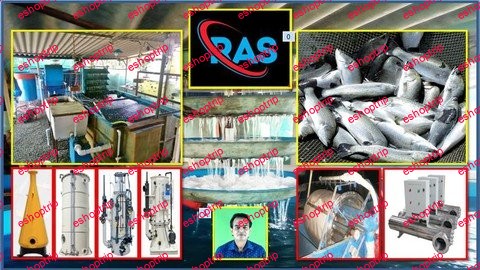Published 3/2024
MP4 | Video: h264, 1920×1080 | Audio: AAC, 44.1 KHz
Language: English | Size: 4.79 GB | Duration: 3h 59m
Step by step guide; Seabass. RAS; Seabass biology & nutrition; Disease management, RAS grow out tank technology,
What you’ll learn
A deep understanding of RAS technology, including the principles of system design, operation, & maintenance specific to Asian Seabass’ RAS grow out culture.
Acquire ample knowledge of the biology, behavior, nutritional requirements, growth patterns, and environmental preferences of Asian Seabass in relation to RAS.
Learn feeding strategies, nutrition management techniques & feed formulations, to optimize growth performance, FCR efficiency & health of Asian Seabass in RAS.
Develop skills and knowledge to implement proactive disease prevention strategies, diagnose diseases, & in effect manage health issues in Asian Seabass in RAS.
Requirements
Before enrolling in my course on Grow-Out Culture of Asian Seabass in RAS, learners should ideally possess the following prerequisites
1. Basic Understanding of Aquaculture Principles: While not mandatory, having a foundational knowledge of aquaculture principles, including water quality management, fish biology, and farm operations, will help learners grasp advanced concepts more effectively.
2. Familiarity with Recirculating Aquaculture Systems (RAS): Prior exposure to RAS technology or aquaculture systems would be beneficial, but not essential. An understanding of the basic components, functions, and operations of RAS facilities will facilitate comprehension of advanced topics covered in the course.
3. Background in Fish Biology and Nutrition: A basic understanding of fish biology, physiology, and nutrition will aid learners in comprehending topics related to Asian Seabass biology, feeding strategies, and nutritional requirements. Knowledge of fundamental concepts such as fish metabolism, growth factors, and dietary needs will enhance the learning experience.
4. Technical Aptitude: Since RAS technology involves the use of equipment, instrumentation, and monitoring systems, learners should be comfortable with basic technical concepts and troubleshooting procedures. Familiarity with equipment operation, data analysis, and maintenance tasks will be advantageous.
5. Access to Learning Resources: Access to relevant textbooks, scientific journals, online resources, and academic databases will supplement the course materials and enrich the learning experience. Learners should be prepared to engage with additional resources to deepen their understanding of specific topics and stay updated on industry advancements.
6. Commitment to Learning: Dedication, curiosity, and a willingness to engage actively with course materials, participate in discussions, and complete assignments are essential for success. Learners should be prepared to invest time and effort into the course to maximize their learning outcomes and achieve their goals in Asian Seabass aquaculture.
By meeting these prerequisites, learners will be well-equipped to engage with the course content, participate in discussions, and apply their knowledge and skills to real-world scenarios in Asian Seabass grow-out culture within RAS environments.
Description
Unlocking Success in Asian Seabass Grow-Out Culture: A Dive into RAS TechnologyWelcome to the fascinating world of Asian Seabass aquaculture, where innovation meets sustainability to redefine the future of fish farming. In this course, we embark on a journey to explore the intricacies of Asian Seabass grow-out culture, with a special focus on the revolutionary Recirculating Aquaculture System (RAS) technology.Aquaculture has emerged as a vital solution to meet the growing global demand for fish food while alleviating pressure on wild fish stocks. Within this dynamic industry, Asian Seabass, also known as Barramundi or Lates calcarifer, stands out as a prized species due to its delicious taste, rapid growth, and adaptability to various environmental conditions.However, traditional aquaculture methods often face challenges such as water pollution, disease outbreaks, and limited space utilization. Enter RAS technology – a game-changer that offers a sustainable and efficient approach to fish farming. By mimicking natural aquatic ecosystems, RAS enables precise control over water quality parameters, leading to healthier fish and minimized environmental impact.In this course, we delve into the fundamentals of 25 cubic meter Asian Seabass grow-out culture within RAS systems, providing a comprehensive understanding of the techniques, principles, and best practices involved. Whether you’re a seasoned aqua-culturist looking to expand your knowledge or a newcomer intrigued by the potential of RAS technology, this course offers valuable insights for all levels of expertise.Key topics covered include:Introduction to Asian Seabass: Gain insights into the biology, behavior, and nutritional requirements of this iconic species.Principles of RAS Technology: Explore the inner workings of Recirculating Aquaculture Systems, including various filtration systems, bioreactor, oxygenation, biosecurity measures, etc.System Design and Management: Learn how to design, optimize, and maintain RAS facilities tailored specifically for Asian Seabass production. Some cheat sheets are given for quick references.Feeding and Nutrition: Understand the dietary needs of Asian Seabass and learn strategies for achieving optimal growth and health.Disease Management: Discover proactive measures to prevent, diagnose, and treat common diseases affecting Asian Seabass in RAS environments.Through a blend of engaging lectures, demonstrations, and our real-world case studies, this course equips you with the knowledge and skills needed to excel in Asian Seabass aquaculture. Whether your goal is to establish a profitable fish farm, contribute to sustainable food production, or simply deepen your understanding of aquaculture practices, this course serves as your gateway to success.Join us on this educational voyage as we unlock the full potential of Asian Seabass grow-out culture through the transformative power of RAS technology. Enroll today and embark on a journey towards a greener, healthier, and more prosperous future for aquaculture.
Overview
Section 1: RAS – Asian seabass tank grow-out culture – An Overview
Lecture 1 Step by step practical guide
Section 2: Asian seabass tank grow out culture
Lecture 2 General information
Section 3: Asian seabass grow out culture tank 25 cubic meter
Lecture 3 Scope of work for 8 months
Section 4: Equipment and Components – 1
Lecture 4 Rearing tank – volume calculation and central & dual drain systems
Section 5: Equipment and Components – 2
Lecture 5 Cone settler – Solid waste removal
Lecture 6 Drum filter – Suspended solid removal – 1
Lecture 7 Granular filter – Suspended solid removal – 2
Lecture 8 Foam fractionator – Fine/dissolved solid removal
Section 6: Addressing Nitrogen Constraints
Lecture 9 Characteristics of MBBR biofilter
Lecture 10 Characteristics of MBBR media
Lecture 11 Sizing of biofilter
Lecture 12 7 – Steps of starting biofilter
Section 7: Dissolved Oxygen
Lecture 13 Oxygenation – Speece cone
Lecture 14 Dissolved oxygen budget
Section 8: Dissolved gas constraints
Lecture 15 Degassing carbon dioxide & other gases
Section 9: Sanitization
Lecture 16 Ultraviolet Sterilization
Section 10: Culture Water
Lecture 17 Water quality parameter
Section 11: Feed and Nutrition
Lecture 18 Feed management
Section 12: Disease Management
Lecture 19 Appropriate strategies
Section 13: Miscellaneous
Lecture 20 Fingerlings
Lecture 21 Cannibalism
Lecture 22 Cheat sheets
This course is designed for a diverse range of learners who are interested in advancing their knowledge and skills in the field of aquaculture, specifically in the context of Asian Seabass grow-out culture within Recirculating Aquaculture Systems (RAS). The intended audience includes:,1. Aquaculture Professionals: Experienced aquaculturists, farm managers, and industry professionals seeking to expand their expertise in RAS technology and enhance their proficiency in Asian Seabass production.,2. Aspiring Fish Farmers: Individuals aspiring to establish or manage their own fish farms and aquaculture operations, particularly those interested in adopting sustainable and intensive production methods using RAS technology.,3. Researchers and Academics: Scientists, researchers, and academics involved in aquaculture research, technology development, or academic instruction who wishes to deepen their understanding of RAS-based Asian Seabass culture.,4. Students and Educators: Undergraduate and graduate students studying aquaculture, fisheries science, marine biology, or related disciplines, as well as educators teaching courses in aquaculture or fish farming.,5. Entrepreneurs and Investors: Entrepreneurs, investors, and stakeholders interested in exploring business opportunities in the aquaculture sector, particularly in sustainable seafood production using innovative technologies like RAS.,6. Aquaculture Enthusiasts: Enthusiasts with a passion for aquaculture and a desire to learn about the latest advancements, best practices, and emerging trends in Asian Seabass grow-out culture and RAS technology.,Regardless of their background or level of expertise, learners in this course will benefit from comprehensive instruction, practical insights, and hands-on learning experiences that will equip them with the knowledge, skills, and confidence to excel in Asian Seabass aquaculture using RAS technology. Whether you’re a seasoned professional, an aspiring entrepreneur, or simply curious about sustainable fish farming practices, this course offers valuable content tailored to meet your learning needs and career goals.
Homepage
https://anonymz.com/?https://www.udemy.com/course/mastering-asian-seabass-grow-out-proven-techniques-for-ras/










